Select Language
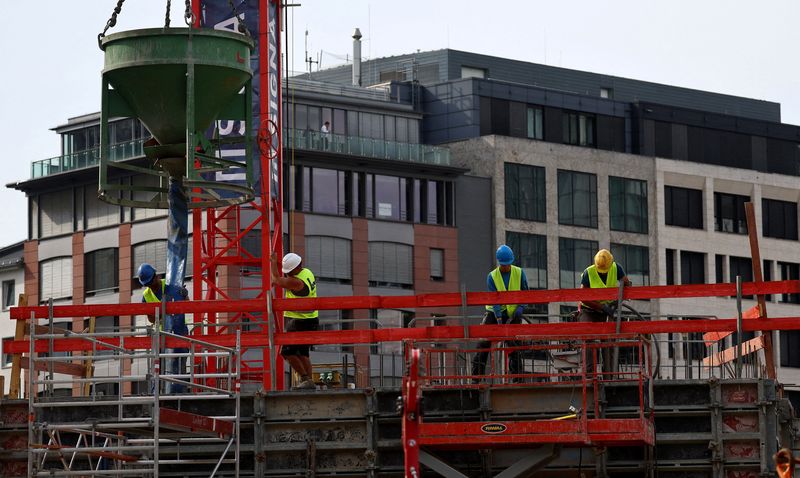
BERLIN (Reuters) - Germany's residential construction sector was again hit by a wave of cancellations in October, according to a survey published on Monday that showed a record number of firms reporting abandoned projects.
In October, 22.2% percent of companies reported cancelled projects, up from 21.4% the previous month, the Ifo economic institute said.
"It's getting worse all the time, with more and more projects failing due to higher interest rates and elevated construction prices," says Klaus Wohlrabe, Ifo head of surveys.
"In residential construction, new business remains very low and companies' order backlogs are diminishing."
The number of companies reporting a lack of orders also increased in October, to 48.7% of firms from 46.6% in September.
A year ago, in October 2022, that proportion was just 18.7%.
"Nearly half of all residential construction companies are now suffering from a lack of orders, and that number is growing every month," said Wohlrabe.
The real-estate sector was a bedrock of Germany's livelihood for years. Fuelled by low interest rates, billions were funnelled into property, which was viewed as stable and safe.
Now a sharp rise in rates and building costs has put an end to the run, tipping developers into insolvency as bank financing dries up, deals freeze and prices fall.
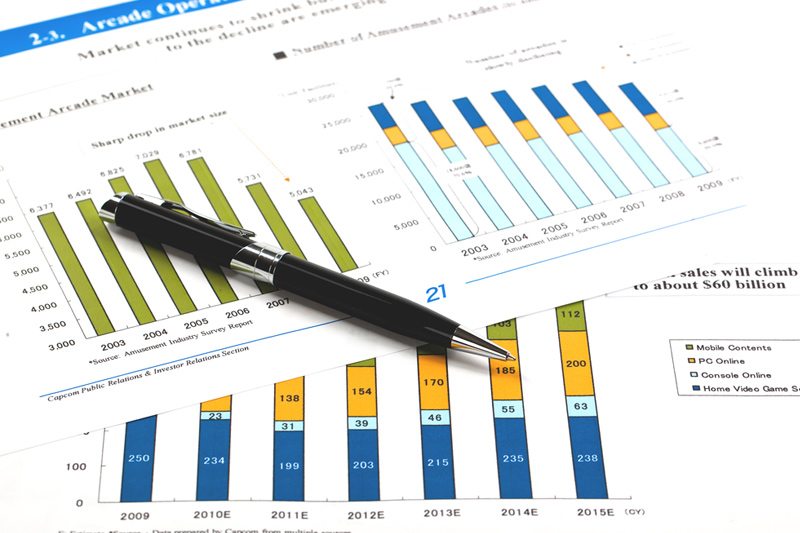
US Treasury bond prices have witnessed a historic drop due to the US government's extensive borrowing plans, leading to yields reaching their highest levels since the global financial crisis. From August to October, the yield on benchmark US Treasuries rose by a percentage point, contradicting expectations that the Federal Reserve's interest rate hikes were coming to an end.
Investors anticipate prolonged high US interest rates, driven by a robust US economy and fresh debt issued to tackle a significant budget deficit. The International Monetary Fund (IMF) estimates that the US government budget deficit will surpass 8% of GDP this year, with net borrowing maintaining a high level at 7% of GDP over five years.
Janus Henderson identifies the unsustainable fiscal framework as a major factor contributing to bond fears. As the Fed halts bond purchases and its long-term debt securities holdings surpass $7 trillion, demand has lessened.
The US Treasury's decision to issue $1 trillion worth of bonds in three months has heightened buyer apprehensions. Despite Japan decreasing its Treasury holdings by 6% and Chinese ownership falling by 14%, Goldman Sachs analysis reveals that American households and hedge funds now hold 9% of the Treasury market.
T Rowe Price (NASDAQ:TROW) underscores the problematic nature of supply increase for bond yields and points to large investors' worries about the US Treasury market.
Nevertheless, Jupiter Asset Management, Academy Securities, and commodity trading advisers maintain that US Treasuries will always find demand given their significant role in the global economy.
This article was generated with the support of AI and reviewed by an editor. For more information see our T&C.

BANGKOK (Reuters) - Thailand's inflation rate fell for the first time in 25 months, thanks to falling energy prices due to government support measures and lower food prices, the commerce ministry said on Monday.
Thailand's consumer price index (CPI) fell 0.31% in October from a year earlier, versus a 0.3% year-on-year rise in the previous month, according to data.
The figure compared with a forecast for 0.0% for October in a Reuters poll. The core CPI was up 0.66% year-on-year in October.
Headline inflation has been below the central bank's target of 1% to 3% for the sixth consecutive month.
In the January-October period, the headline CPI rose an average 1.60% from the same period a year earlier, with the core CPI up 1.41%.
The ministry still sees headline inflation at 1.0% to 1.7% this year.
In September, the Bank of Thailand's monetary policy committee unexpectedly raised the key interest rate by a quarter point to 2.50%, the highest in a decade, saying growth and inflation should pick up next year. It will next review policy on Nov. 29.

JERUSALEM (Reuters) - Israel's war with Hamas in the Gaza Strip will cost as much as 200 billion shekels ($51 billion), the Calcalist financial newspaper reported on Sunday, citing preliminary Finance Ministry figures.
The daily said the estimate, equal to 10% of gross domestic product, was premised on the war lasting between eight to 12 months; on it being limited to Gaza, without full participation by Lebanon's Hezbollah, Iran or Yemen; and on some 350,000 Israelis drafted as military reservists returning to work soon.
Calcalist described the ministry as deeming 200 billion shekels an "optimistic" estimate. But the ministry said it does not stand by Calcalist's data.
Hamas gunmen from Gaza launched the deadliest attack on Israel's civilians in the country's history on Oct. 7 and Israel has since bombarded Gaza with the goal of eliminating the group.
Calcalist said half of the cost would be in defence expenses that amount to some 1 billion shekels a day. Another 40-60 billion shekels would come from a loss of revenue, 17-20 billion for compensation for businesses and 10-20 billion shekels for rehabilitation.
Finance Minister Bezalel Smotrich has previously said Israel's government was preparing an economic aid package for those impacted by Palestinian attacks that will be "bigger and broader" than during the COVID-19 pandemic.
On Thursday, Prime Minister Benjamin Netanyahu said the state was committed to helping everyone affected.
"My directive is clear: Open the taps and channel funds to whoever needs them," he said without giving figures. "Just like we did during COVID. In the past decade, we have built here a very strong economy and even if the war exacts economic prices from us, as it is doing, we will pay them without hesitation."
In the wake of the war, S&P cut its outlook for Israel's rating to "negative", while Moody's (NYSE:MCO) and Fitch put Israel's ratings on review for possible downgrade.
($1 = 3.9119 shekels)

Oil prices made a downward turn on Friday, spurred by easing Middle East supply concerns amidst the Israel-Hamas war and speculation of the US Federal Reserve halting interest rate hikes. Brent crude futures were recorded at $84.89 a barrel while West Texas Intermediate crude stood at $80.51 a barrel, marking a weekly drop exceeding 6%. Despite warnings of potential wider conflict at Lebanon’s border with Israel by Hezbollah leader Sayyed Hassan Nasrallah, markets remained steady. John Kilduff of Again Capital LLC stated that this conflict seems unlikely to significantly disrupt demand or supply.
The slower-than-expected US job growth in October and cooled wage inflation suggest softer labor market conditions, reducing the need for further Fed rate hikes. Meanwhile, the Bank of England maintained its 15-year peak rates, fostering some risk appetite. However, China's services activity showed only modest expansion in October as sales growth hit a 10-month low and employment stagnated due to declining business confidence.
Turning to South Africa, World Bank forecasts indicate that barring geopolitical escalations, fuel prices should remain stable during the festive season. This prediction is tied to an average global oil price of $90 per barrel in Q4, influenced by a drop in Brent crude prices from $91.86 to $88.72 per barrel due to a slowdown in global economic growth and increased production from non-OPEC+ producers.
The recent minor R1.78 per liter cut in petrol prices driven by increased global oil inventories and the lifting of US sanctions on Venezuela is expected to eventually benefit both the logistics supply chain and retail pricing. However, consumers find this cut inadequate given the current prices of R23.90 per liter for 95 unleaded petrol and R23.44 for 93 unleaded petrol.
The Absa Purchasing Managers' Index, at 45.4 index points in October, indicates depressed demand for local goods due to high food and fuel prices, with the AA predicting the fuel price decrease to persist through the festive season. This comes amid a July 2023 price break and an 8.1% food inflation rate according to Stats SA figures, along with a R5.71 diesel price hike since June and a current Brent crude oil price of $87.25.
Road Freight Association CEO Gavin Kelly noted a delayed logistics impact due to warehouse reserves while Debt Rescue CEO Neil Roets highlighted cost-of-living increases causing financial instability. UASA spokesperson Abigail Moyo advised prudent spending due to high fuel costs affecting travel and upcoming education expenses.
Despite high living costs persisting for South Africans due to rising electricity and food prices, consistent interest rate hikes, and continuous petrol price increases, the anticipated stability in fuel prices should provide temporary relief for consumers. Experts recommend prudent travel arrangements during the festive season considering the upcoming financial pressures at the start of the new year.
This article was generated with the support of AI and reviewed by an editor. For more information see our T&C.
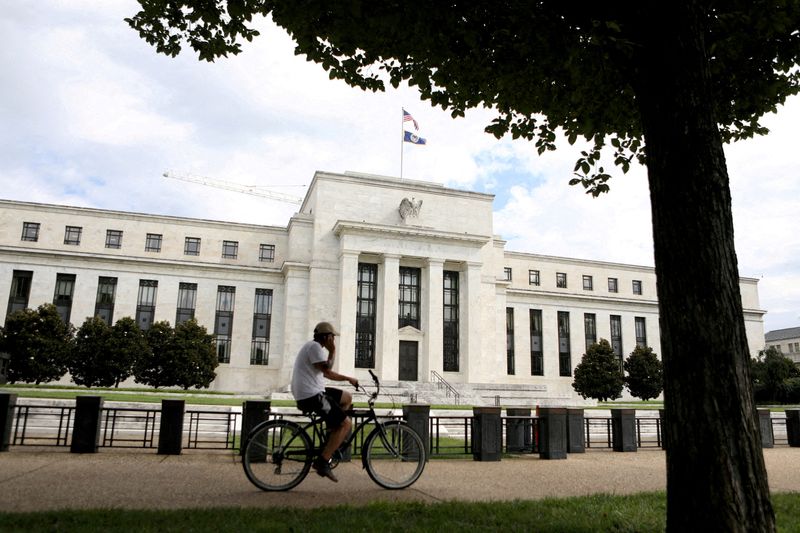
LONDON (Reuters) - Next week will have plenty to keep financial market traders and investors busy, including whether the Federal Reserve really has hit peak rates, another possible rate rise in Australia, a batch of European bank earnings and the continuing conflict in Gaza.
Here's your week-ahead primer from Marc Jones and Dhara Ranasinghe in London, Kevin Buckland in Tokyo, Tom Westbrook in Singapore and Lewis Krauskopf in New York.
1/GRAND PLANS
Having marched interest rates all the way to the top of the hill, investors are now wondering whether the grand old dukes of the central bank world - the Fed, ECB, BoE & co - might soon be marching them down again.
Take the ECB -- with euro zone inflation coming down fast and the economy heading for either stagnation or recession money markets now see rate cuts starting in April while for the BoE in Britain it is next August.
The U.S. economy still looks impressively robust, but even there cracks are starting to show, if the sharp contraction in manufacturing data is anything to go by.
No wonder markets see a 70% chance that the Fed's brutal 20-month tightening cycle is over and that rate cuts could begin as soon as June.
That light at the end of the tunnel has meant world stocks have just had their best week of the year so far. So watch closely to see if the top central bankers push back against the cut chatter until inflation is truly tamed.
2/YO-YO YEN
FX traders spent months nervously watching the yen inch towards 150 per dollar only to see the Bank of Japan itself shove it well over the line this week with a decidedly tepid plan to dismantle its decade-old stimulus programme.
The yen shot straight back up when the markets sensed the Fed might finally have reached peak rates so next week could be an interesting one.
While worries about 150 as a trigger have surely been washed away, the risk of BOJ intervention remains very real because both a weak yen and the current prime minister are increasingly unpopular with the Japanese public.
And as any top central banker will tell you, the time to intervene in your currency market is just after the tide has turned and the wind is on your back.
3/CHURNING THE EARNINGS The U.S. earnings recovery that investors had been hoping for after a lukewarm first half of the year is so far coming to pass, but a number of major tests are still to come. With over 300 companies now reported, S&P 500 earnings are estimated to be up 5% year-on-year with about 80% of firms coming in with forecast-beating numbers. Heavy hitters next week include eBay (NASDAQ:EBAY) and D.R. Horton on Tuesday and Walt Disney (NYSE:DIS) and Biogen (NASDAQ:BIIB) on Wednesday. Later in the month, investors get to size up some of the major U.S. retailers as well as the big winner of this year's AI frenzy, Nvidia (NASDAQ:NVDA).
In Europe it's all about the money and the metal, with UBS on Tuesday, Commerzbank (ETR:CBKG) and ABN Amro on Wednesday, steel giant Arcelor Mittal on Thursday and insurance heavyweight Allianz (ETR:ALVG) on Friday.
4/ONE MONTH IN
Next week marks a month since the deadly attack by Hamas in Israel triggered the worst escalation of the long-running Middle East conflict in decades.
Israeli forces have pushed into Gaza City in the north of the Gaza Strip, but are facing resistance from militant hit-and-run attacks from underground tunnels. Gaza health authorities say the Palestinian death toll now exceeds 9,000.
For those in the financial markets watching nervously it is a crucial moment. Safe-haven gold has surged almost 10% since the troubles ignited but the initial spike in oil prices, triggered by fears Iran could be drawn into the crisis, has fully subsided and even Israel's shekel has started to bounce.
The situation could quickly spiral again, though. An increasing number of countries are calling for a pause in hostilities, Hezbollah is agitating, while U.S. Secretary of State Antony Blinken is visiting Israel, Jordan and other countries in the region in the coming days for a new round of diplomatic talks.
5/RACE DAY RATE HIKE
The famous Melbourne Cup horse race runs on Tuesday, but some of the shortest odds are on an Aussie central bank rate hike over in Sydney that day. Following a hotter-than-expected third-quarter inflation print, where the RBA's preferred measure of core inflation rose to 1.2%, markets price a near 60% chance of a quarter point hike. All of the "Big Four" Australian banks forecast a hike, too, including Westpac where newly-installed chief economist Luci Ellis was until recently assistant governor at the RBA. Indeed futures imply a real risk that the 4.1% cash rate could be raised twice to 4.60% and kept there for all of 2024. Three-year and 10-year Australian government bond yields have hit their highest since 2011, though backed off slightly on the Fed's hold. The Australian dollar has also rallied strongly against its New Zealand counterpart as rate expectations diverge.
(Complied by Marc Jones; graphics by Kripa Jayaram, Riddhima Talwani and Prinz Magtulis; Editing by Gareth Jones)
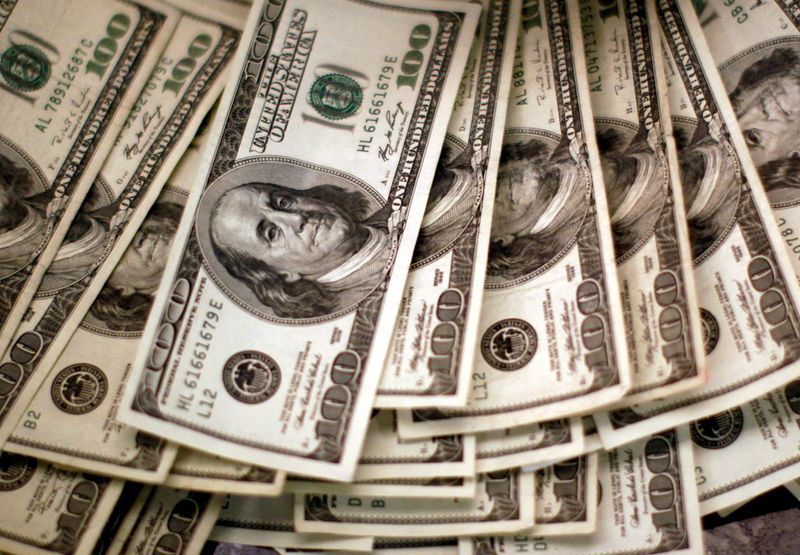
By Ankur Banerjee
SINGAPORE (Reuters) - The dollar eased on Friday and was on course for a weekly decline against a basket of currencies as traders wagered that the U.S. Federal Reserve was most likely done with rate increases, lifting risk sentiment.
The dollar index, which measures the U.S. currency against six rivals, was down 0.122% at 106.07, not far from the one-week low of 105.80 it hit on Thursday.
The index is on course to drop 0.4% for the week, just its third week of losses in the last 16 weeks.
Markets are now pricing in less than a 20% chance of a rate increase in December compared with 39% earlier, CME FedWatch tool showed, in the wake of the U.S. central bank's holding interest rates steady on Wednesday. The Fed, however, left the door open to a further increase in borrowing costs in a nod to the economy's resilience.
"Fed is now walking a tightrope between financial conditions and rate hikes," said Moh Siong Sim, currency strategist at Bank of Singapore, noting that the Fed said rising bond yields are doing some work for it and it can afford to wait and see.
But since the Fed's policy decision, the yield on 10-year Treasury bonds have dropped over 20 basis points. A holiday In Japan meant cash Treasuries were untraded in Asia on Friday.
"There's still this underlying tension here that could be a worry but for now market has become more relaxed," said Sim.
Data on Thursday showed the number of Americans filing new claims for unemployment benefits increased moderately last week as the labour market continued to show few signs of a significant slowdown.
Investor focus will switch to October non-farm payrolls data later in the day, with the U.S. expected to have added 180,000 jobs in October, according to a Reuters poll of economists. A weaker result will likely put further pressure on the dollar.
"Even if October nonfarm payrolls were to come ahead of expectations, this wouldn’t necessary support calls for the Fed to hike in December," said Julien Lafargue, chief market strategist at Barclays Private Bank.
"Indeed, the central bank appears to be more focused on inflation rather than jobs and economic growth."
Analysts said upcoming economic data will likely determine whether the weakness in dollar will be sustained.
Christopher Wong, currency strategist at OCBC, said a more entrenched disinflationary trend, and a material easing of U.S. labour market tightness and activity data are needed for the dollar to trade softer.
But for now, Wong said, the dollar still retains a "significant yield advantage and is a safe haven proxy to some extent."
In other currencies, sterling was at $1.2198, down 0.02% on the day, having risen 0.4% on Thursday, and was on course for a 0.5% weekly gain. The euro was up 0.05% at $1.0625, also set to clock a weekly gain of 0.5%.
The Bank of England joined other major central banks in holding rates steady on Thursday and stressed that it did not expect to start cutting them any time soon.
The European Central Bank last week snapped a streak of 10 straight rate increases, with the discussion shifting to how long rates would stay high.
ECB board member Isabel Schnabel said on Thursday the "last mile" of disinflation may be the toughest, and the central bank cannot yet close the door on further rate rises.
The yen strengthened 0.11% to 150.28 per dollar, keeping traders nervous and looking for signs of intervention from Japanese authorities.
The yen has had a whirlwind week, touching a one-year low against the dollar and 15-year low against the euro on Tuesday after the Bank of Japan tweaked its yield curve control policy.
Kazuo Ueda, the central bank's governor, will continue to dismantle its ultra-loose monetary policy and look to exit the decade-long accommodative regime next year, Reuters reported on Thursday, six sources familiar with the central bank's thinking.
The Australian dollar was little changed at $0.6434, just shy of the over one-month high of $0.6456 it touched on Thursday. The New Zealand dollar was 0.12% higher at $0.5901.
Both the Aussie and the kiwi are up 1.6% for the week, their best weekly performance since mid-July.
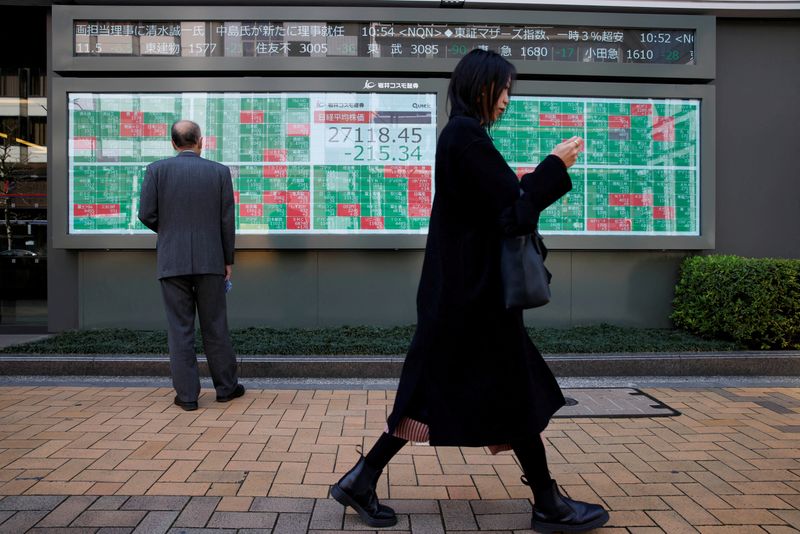
By Tom Westbrook
SINGAPORE (Reuters) - Stocks were headed for their biggest weekly rise in a year on Friday, while bonds rallied and the dollar was on the back foot as investors cheered a pause in U.S. interest rate hikes.
U.S. jobs data due later in the day is the next major focus.
Benchmark 10-year Treasury yields are down more than 20 basis points in two sessions since the U.S. Federal Reserve left rates on hold on Wednesday and Chair Jerome Powell said risks to the outlook for rates settings was balanced.
Cash Treasuries were untraded in Asia as markets were closed in Tokyo due to a holiday, and 10-year futures held recent gains to imply yields were steady at 4.67%. MSCI's broadest index of Asia-Pacific shares outside Japan rose 0.9%.
S&P 500 futures were 0.1% lower, weighed by a 3% fall for Apple shares (NASDAQ:AAPL) in post-market trade after the tech giant's sales forecast fell short of expectations.
World stocks are up 4.2% for the week so far, their largest weekly rise since November 2022.
"Markets have become increasingly confident that rates in the U.S. have now peaked," said ANZ analysts in a note.
"As logical as that is ... Powell did warn that for higher bond yields to forestall another hike, they'd need to stay high, so markets can't have their proverbial cake and eat it too."
The U.S. Treasury department had also said on Wednesday that it would sell less longer-dated debt at auction than had been expected and a softer-than-forecast manufacturing survey helped reinforce bets that no further hikes are necessary.
On Thursday, the Bank of England also left interest rates on hold and stressed it did not expect to cut them any time soon.
Ten-year gilts had their sharpest rally in more than a month, sending yields almost 12 basis points lower to 4.39%. Ten-year German bund yields also fell on Thursday, though only by 4.6 bps to 2.71%.
"It felt like there were a decent chunk of investors waiting on the sidelines and ready to play lower yields and yesterday removed a couple of potential stumbling blocks to enacting that view," said Rabobank analysts.
PAYROLLS LOOM
In foreign exchange markets the Australian dollar is leading gains among G10 currencies this week after a third-quarter inflation surprise had traders betting on a rate hike from the Reserve Bank of Australia (RBA) on Tuesday.
Australian retail sales stumbled in the September quarter, with sales-per-person posting the largest annual drop on record, data on Friday showed.
The Australian dollar is up 1.5% to $0.6430 and has broken above its 50-day moving average. The New Zealand dollar is not far behind with a 1.4% gain to $0.5892. [AUD/]
"Money markets are more than fully priced for another RBA hike by Q1, eye-catching in the G10. So the Aussie has a degree of support from RBA expectations that it has rarely had since the pandemic," said Westpac analyst Sean Callow.
"(But) a run at $0.65 is likely to require either a notably weak U.S. jobs report or a hawkish hike from the RBA."
Economists polled by Reuters expect the U.S. to have added 180,000 jobs in October.
The worst performing G10 currencies for the week have been the havens of Japanese yen and the Swiss franc as investors have sought out riskier assets.
The Bank of Japan will continue to dismantle its ultra-easy monetary policy next year, six sources familiar with the BOJ's thinking told Reuters, though the slow progress has been cold comfort for a yen weighed down by Japan's low interest rates.
It traded at 150.44 per dollar on Friday. Brent crude futures are 4% lower on the week to $86.80 a barrel. Gold is down 1% at $1,983 an ounce.
Bitcoin has surged 15% with the mood and looks to be reviving momentum that had collapsed along with exchange FTX in 2022. FTX founder Sam Bankman-Fried was found guilty of stealing from customers on Thursday. Bitcoin bought $34,600.
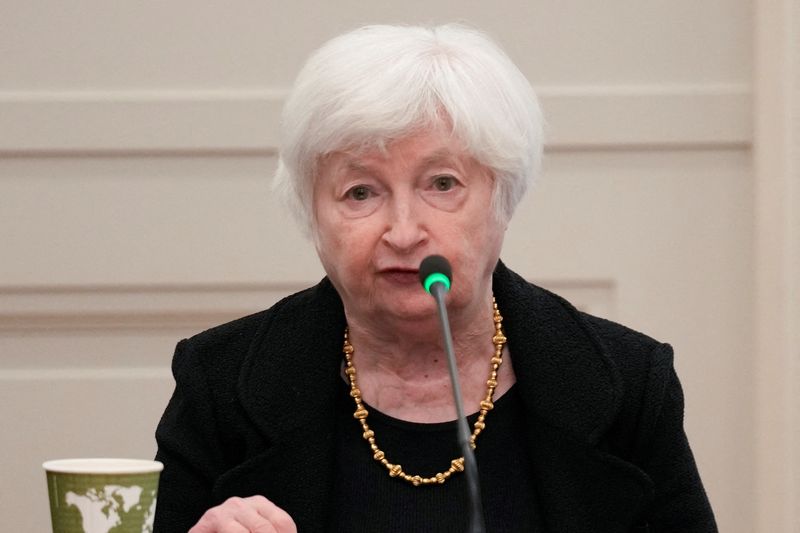
By David Lawder
WASHINGTON (Reuters) -U.S. Treasury Secretary Janet Yellen on Thursday sought to reassure Asian countries that the U.S. approach to China would not lead to a 'disastrous' division of the global economy that would force them to take sides.
In a speech ahead of the U.S.-hosted Asia Pacific Economic Cooperation Summit in San Francisco later this month, Yellen said that a full de-coupling of the U.S. and Chinese economies was "simply not practical," especially given the complexity of Asian supply chains and the region's deep economic ties to China.
Her comments sought to assuage growing concerns about geopolitical fragmentation of the global economy into U.S.-led and China-led factions amid growing national security-driven export and technology controls between the world's two largest economies.
"A full separation of our economies, or an approach in which countries including those in the Indo-Pacific are forced to take sides, would have significant negative global repercussions," Yellen said. "We have no interest in such a divided world and its disastrous effects."
Yellen said the U.S. instead was pursuing the "de-risking and diversifying" of its economic ties to China, by investing in manufacturing at home and by strengthening linkages with allies and partners around the world, including Indo-Pacific countries.
Yellen said the U.S. would not compromise on national security actions, but aimed to keep them narrowly targeted, not for the purpose of "choking off growth in China."
Her remarks to an Asia Society event came as the U.S. is preparing to host leaders and other top officials from APEC countries in San Francisco from Nov. 11-17. The White House wants to schedule a meeting between U.S. President Joe Biden and Chinese President Xi Jinping alongside the summit.
TRADE, INVESTMENT LINKS
Yellen said the Biden administration was committed to expanding trade and investment with Indo-Pacific countries, emphasizing the region's strategic importance ahead of the APEC gathering.
Deeper economic links with Indo-Pacific countries will help make U.S. supply chains more resilient and tap into a dynamic and growing market for U.S. exports, she said.
"As we look toward APEC later this month, let me state unequivocally: Claims that America is turning away from the Indo-Pacific are wholly unfounded," Yellen said in the excerpts. "We are deepening our economic ties across the region, with tremendous potential benefits for the U.S. economy and for the Indo-Pacific."
The Biden administration also has called a seventh negotiating round for its Indo-Pacific Economic Framework for Prosperity (IPEF) initiative next week in San Francisco, aimed at reaching some agreements in time for the APEC summit.
IPEF, while far short of a traditional free trade agreement, is the Biden administration's signature initiative to engage economically with Asian countries and provide them a trade and investment alternative to China.
Yellen said deeper integration with Indo-Pacific countries would benefit the region and the U.S. She noted that U.S. two-way trade with the region reached a value of $2.28 trillion in 2022, up 25% since 2019, with the region taking nearly a quarter of U.S. exports.
"The economic case for our expanding trade and investment is clear. The Indo-Pacific is a dynamic and rapidly growing region. As it grows, we gain a fast-expanding customer base for U.S. firms and workers," Yellen said.
SUPPLY CHAIN SECURITY
Part of the reason for increased trade with the region has been the migration of U.S. supply chains away from China, a trend that started with tariffs imposed by former President Donald Trump in 2018 and accelerated since the COVID-19 pandemic.
Yellen said economic engagement with Indo-Pacific countries, including Vietnam, is "crucial to bolstering our supply chain security" to avoid bottlenecks and shortages that occurred as the world emerged from the pandemic. She repeated her desire to diversify supply chains to countries in the region through "friend-shoring" or using trusted allies as sources of supply.
"And achieving resilience through partnering with Indo-Pacific countries means gains for Indo-Pacific economies as well," Yellen said.
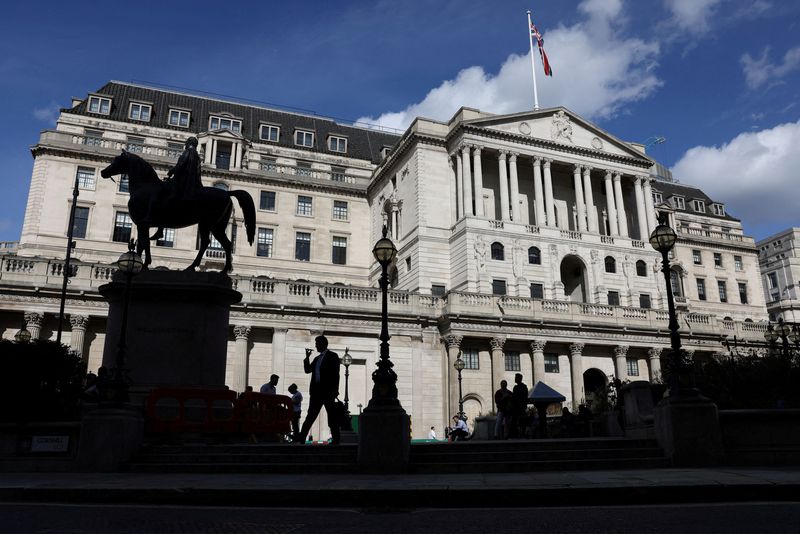
By William Schomberg and Andy Bruce
LONDON (Reuters) -The Bank of England held interest rates at a 15-year peak on Thursday and ruled out cuts any time soon as it fights to "squeeze out of the system" the highest inflation of the world's big rich economies.
Despite saying the economy was close to a recession and would have no meaningful growth in the coming years, the BoE reinforced its message that it would keep borrowing costs high.
The Monetary Policy Committee (MPC) voted 6-3 to keep Bank Rate at 5.25%, repeating its September decision after 14 back-to-back increases, as expected in a Reuters poll of economists.
"The MPC's latest projections indicate that monetary policy is likely to need to be restrictive for an extended period of time," the British central bank said.
Britain's economy is already under strain from the run-up of interest rates between December 2021 and August this year, with about half of the impact of those rate hikes yet to be felt.
Warning against complacency, Governor Andrew Bailey said inflation was still too high and that the BoE was determined to get it all the way back to its 2% target.
"We will be watching closely to see if further increases in interest rates are needed," he said. "But even if they are not needed, it is much too early to be thinking about rate cuts."
British government bond yields were down sharply as investors looked at the gloomy economic picture painted by the BoE and decided its next move in rates was likely to be lower.
The BoE will keep monetary policy restrictive only for long enough to "squeeze inflation out of the system", Bailey said.
The European Central Bank and the U.S. Federal Reserve have similarly decided to keep rates on hold in recent days as they wait to see if their strong dose of rate hike medicine will curb the world's worst outbreak of inflation in decades.
Ellie Henderson, an economist with Investec, said central bankers on both sides of the Atlantic were avoiding the kind of guidance that proved misplaced early in inflation's rise.
"In an extremely uncertain world – including on what exactly would constitute a 'neutral' level of interest rates – there is little to gain from central banks calling the end and putting their credibility on the line should a resumption of rate rises become necessary after all," she said.
Bailey acknowledged that the conflict in the Middle East created a risk of higher energy prices that could feed through into inflation, but said that had not happened so far.
MPC members Megan Greene, Jonathan Haskel and Catherine Mann voted to raise rates to 5.5%. Sarah Breeden voted to keep rates on hold at her first meeting since replacing Jon Cunliffe.
FLAT-LINING ECONOMY
Although inflation has fallen from 11.1% - its highest since the 1980s - just over a year ago to 6.7% in the most recent data, it remains more than three times the BoE's 2% target.
The central bank said it expected no growth in Britain's economy in July-September, before expansion of just 0.1% in the fourth quarter. It forecast zero growth in 2024 and an expansion of just 0.25% in 2025.
Even so, inflation would only return to 2% at the end of 2025, roughly six months later than previously forecast.
Markets continued to bet that the BoE would keep interest rates on hold until at least August next year, when it would probably start to lower them. The BoE showed no sign that it was challenging those expectations in its forecasts.
Economists were split on when Bank Rate might fall. Investec's Henderson pointed to the second quarter of 2024 as inflation cools. Allan Monks at JP Morgan predicted rates would stay on hold throughout next year.
The BoE said the inflation rate was likely to drop to 4.8% in October, almost two full points lower than in September, as the impact of last year's gas price surge fades.
It is still keeping a close eye on strong wage growth, however, which it fears could keep price pressures simmering.
The central bank said there were "increasing uncertainties" about official labour market data, which has been hampered by low survey response rates, but jobs growth was likely to have been weaker than it previously thought. It also expected worryingly strong growth in wages would cool off.
One detail in the BoE's otherwise downbeat assessment of the economy is likely to be welcomed by Prime Minister Rishi Sunak.
It predicted inflation of 4.6% in the fourth quarter of 2023, which would mean Sunak meets his pledge to voters to have price growth this year, ahead of an election expected in 2024.

